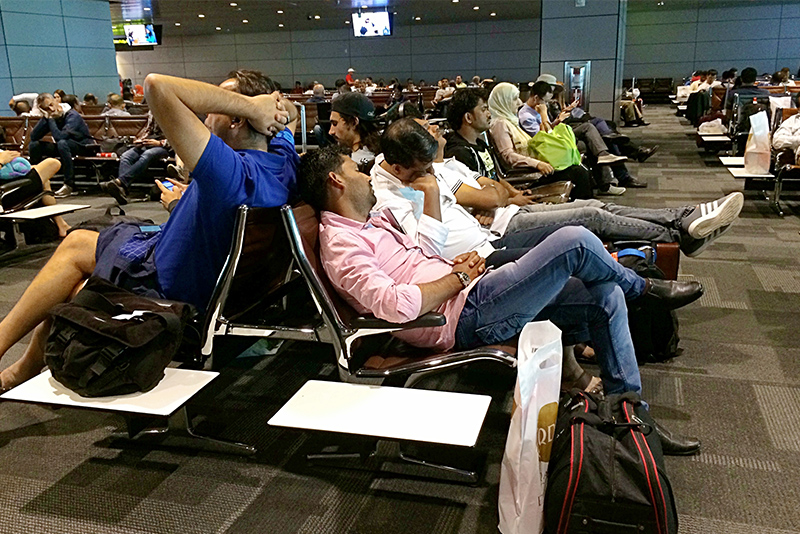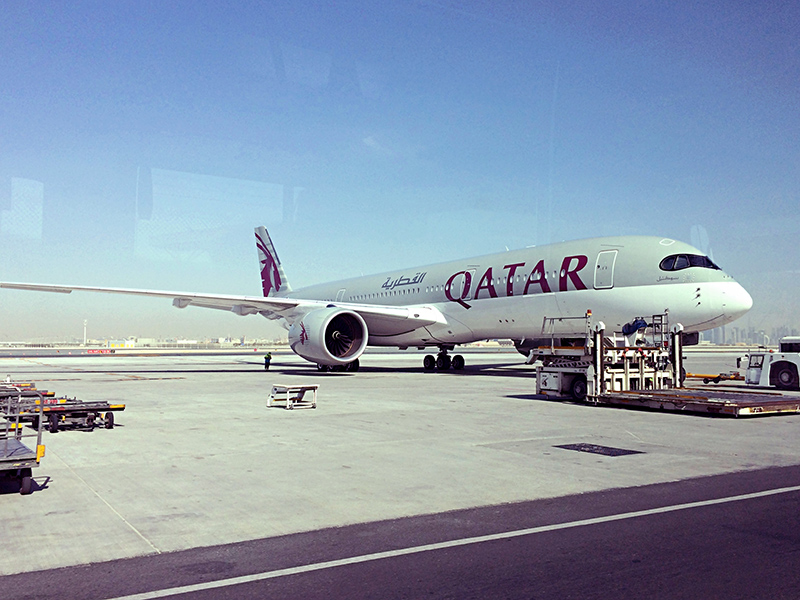Qatar's crisis is impacting business and millions of people

Passengers of cancelled flights wait in Hamad International Airport (HIA) in Doha, Qatar, Tuesday, June 6, 2017. Qatar's foreign minister says Kuwait is trying to mediate a diplomatic crisis in which Arab countries have cut diplomatic ties and moved to isolate his energy-rich, travel-hub nation from the outside world. Airlines suspended flights and residents cleaned out store shelves. Bahrain, Egypt, Saudi Arabia and the United Arab Emirates said Monday they would cut diplomatic ties. AP/Hadi Mizban
DUBAI, United Arab Emirates — Hatoon al-Fassi's children will have their final exams for school in Qatar in three weeks' time, but as Saudi nationals they have just two weeks to leave the country under new measures being felt by ordinary people and businesses there.
The political storm surrounding Qatar is impacting life in one of the world's biggest natural gas producers and travel hubs that relies on food imports. Millions of people have already been affected, with many Arab residents in Qatar unsure of their fate.
Years of tensions in Gulf relations burst to the surface on Monday when Saudi Arabia, the United Arab Emirates, Bahrain and Egypt severed ties with Qatar. The four Arab countries shut down land, sea and air links with Qatar, accusing it of supporting terror groups in the region, interfering in their sovereign affairs and backing groups that undermine political stability.

A parked Qatari plane in Hamad International Airport (HIA) in Doha, Qatar, Tuesday, June 6, 2017. Qatar's foreign minister says Kuwait is trying to mediate a diplomatic crisis in which Arab countries have cut diplomatic ties and moved to isolate his energy-rich, travel-hub nation from the outside world. AP/Hadi Mizban
Saudi Arabia, the UAE and Bahrain also ordered their citizens — who travel visa free throughout the six-nation Gulf bloc that includes Qatar — to leave the peninsula nation and warned against travel to or transit through Qatar. The fate of some 300,000 Egyptian residents there remains unclear.
"The situation is very hard for me. It's as if life has been flipped on its head," said al-Fassi, the Saudi professor who teaches Gulf Affairs and Women's Studies at Qatar University. "I have responsibilities here that are time sensitive and final exams."
The effect of Monday's punitive measures on Qatar was immediate. Panicked residents rushed to grocery stores to stock up on essential food items as hundreds of trucks transporting food and construction materials were stopped from entering Qatar from Saudi Arabia. Qatar, a mostly dessert nation that juts off Saudi Arabia's eastern coast, imports more than 40 percent of its food needs through its only land border with Saudi Arabia.
Business impact
Qatar's stock market fell by more than 7 percent Monday, though it recovered somewhat Tuesday.
Flights were delayed at Qatar's Hamad International Airport, which serves as a major transit hub for 37 million passengers a year, largely between Europe and Asia. Its flagship carrier, Qatar Airways, was forced to reroute Europe-bound flights over Iranian and Turkish airspace after Saudi Arabia and Egypt blocked Qatari flights from using their airspace.
Qatar Airways also stopped its flights to the four Arab countries in response to the UAE's Etihad, FlyDubai, Emirates, EgyptAir and Bahrain's Gulf Air suspending flights to Qatar.
The moves against Qatar reflect longstanding anger at its support for Islamists, like the Muslim Brotherhood group, as well as Qatar's ties with Iran, Saudi Arabia's regional enemy.
Qatar's Cabinet said the decision to cut ties was based on "fabricated allegations and lies." It sought to reassure its citizens and residents by suggesting that the government had a contingency plan for vital imports. The government said it had "already taken the necessary measures and precautions to ensure that normal life continues."
Meanwhile, Iran's semi-official Fars news agency reported that the country is ready to ship food products to Qatar.
John Sfakianakis, director of economic research at the Gulf Research Center in Saudi Arabia, says the overall uncertainty will have an impact that extends beyond Qatar.
"Investors like predictably and transparency on such matters," he said. "If it drags out for a long period of time (many months), it will be more of a GCC-wide problem," he said, referring to the acronym for Gulf bloc of states.
Beyond the Gulf
Outside of the Gulf region, the economic and financial impact seems limited so far.
The country, while small at just around 270,000 citizens, is extremely wealthy. It invests heavily overseas through its sovereign wealth fund, including in cities like London, Paris and New York. It has stakes in everything from banks to airports to real estate, including the Empire State Building in New York and the Shard and Harrods in London. These investments do not appear under threat.
Qatar is also the world's biggest producer of liquefied natural gas, sharing a vast underwater field with Iran, and exports heavily.
Abu-Dhabi's The National newspaper reported that Qatar's natural gas supplies were flowing as normal to the UAE, despite the severing of ties. Qatar gas imports represent a third of the UAE's daily needs. The sub-sea gas pipeline that runs between Qatar and the UAE transits onward to Oman, which has remained neutral in the Gulf spat. Egypt also relies heavily on liquefied gas imports from Qatar.
Jason Tuvey, economist at Capital Economics in London, said the impact on crude oil markets will "likely be limited" largely because Qatar is one of the smaller producers within the OPEC oil cartel, with daily production of some 0.6 million barrels.
Most of Qatar's gas exports go to Asia — 72 percent according to the U.S. Energy Information Administration — via sea. There are no signs that Qatar's neighbors want to escalate the spat by blockading its ships, Tuvey said.
However, the political standoff, if prolonged, could affect Qatar's efforts to emerge as a regional financial hub and host the World Cup games in 2022, the consultancy Eurasia Group says. The crisis will increase inflation in Qatar, raise the risk of a credit rating downgrade and curtail regional banking activity.
Egypt's Al Ahly bank posted a zero for the Qatari exchange rate on its display board, though the Central Bank of Egypt denied that it ordered banks to stop selling or buying the Qatari riyal.
The tightknit six-nation bloc of Gulf Arab nations has long prided itself on unity and the shared culture, heritage and history of its people. Tribes expand across the Gulf's borders — drawn only in 1971 — and families are interrelated among the various nationalities that widely see themselves as uniquely "khaleeji", Arabic slang for people of the Gulf.
For al-Fassi and the millions of people impacted by the crisis, the measures taken against Qatar seem almost untenable.
"Tribes, marriages and family are interrelated so it's hard to draw a barrier between people. Let me say it's impossible," she said.
___
Pan Pylas in London, Maggie Michael in Cairo and Amir Vahdat in Tehran, Iran contributed to this report.
- Latest
- Trending



























